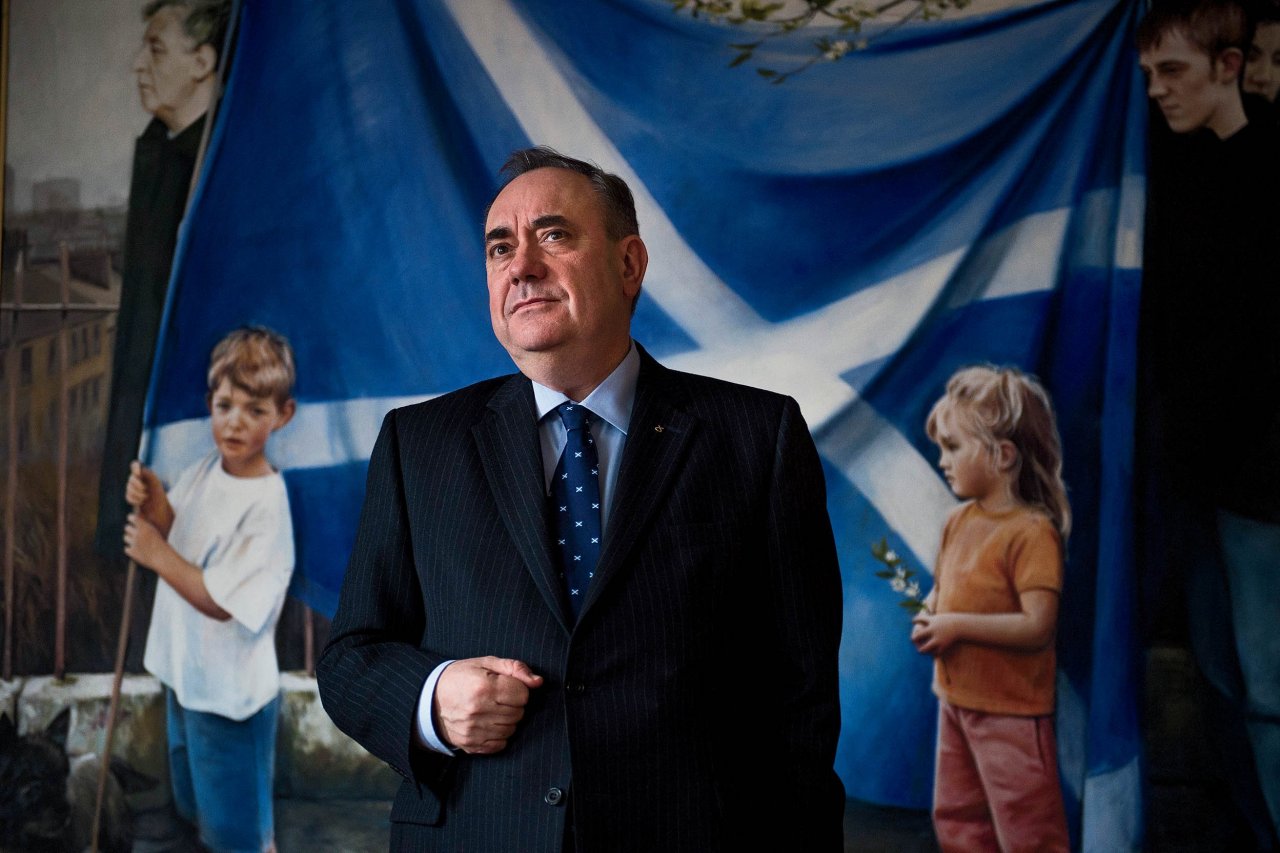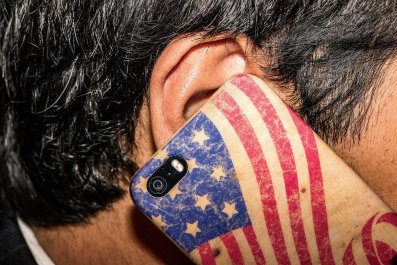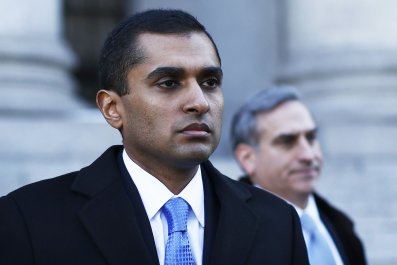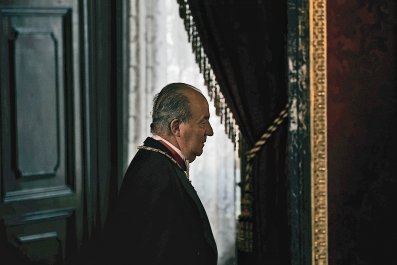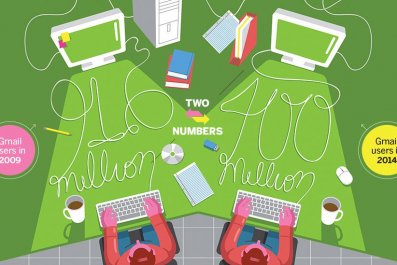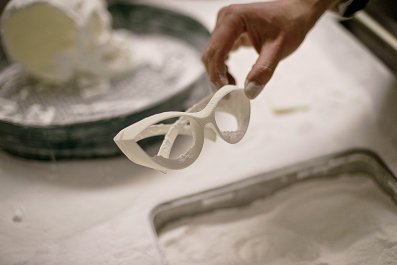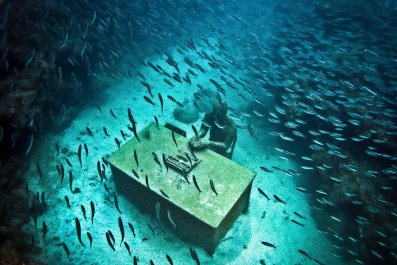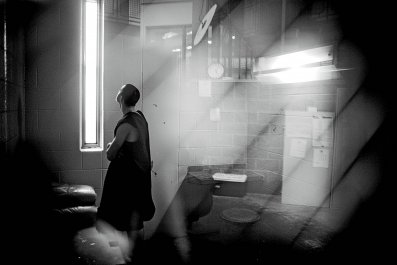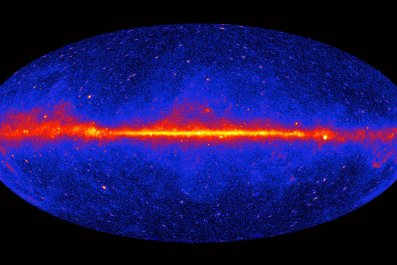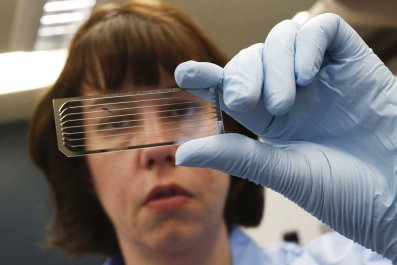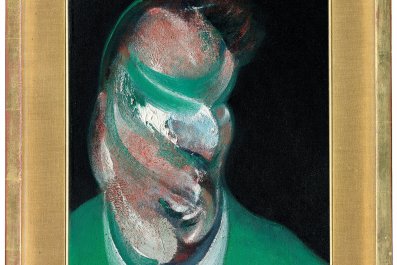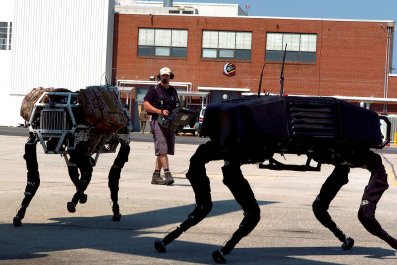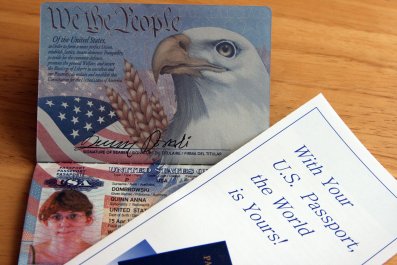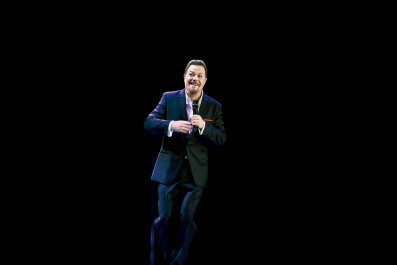As military re-enactments go, Box Wars at the annual Meadows Festival in Edinburgh, is unusual. After an afternoon creating elaborate armour, helmets and weapons from cardboard boxes and gaffer tape, adversaries line up on the muddy sward in the centre of a noisy, bustling summer fair. The master of ceremonies bestows mock-heroic names; the crowd, slightly addled by the June sunshine, cheers lustily; and the warriors charge, tearing off each other's breastplates and codpieces, bopping each other on the head with wobbly swords and spears, and stamping squishy helmets into the grass.
It is not a fair fight. Boxasaurus, a huge fellow, lays waste to all about him and is declared the winner. A kilted, ethereal-looking warrior, named Celtic Prince, doesn't stand a chance. Pushed to the ground and stripped of weapons and armour, he struggles to save even his modesty as he ends up supine.
In the stalls running alongside the festival, jousting has a less light-hearted echo, as two sides of a fight over Scotland's place in the United Kingdom are readying themselves for the final assault. Opinion polls suggest a less-than-convincing victory for the mighty British state over the proponents of an independent Scotland in the referendum to be held on September 18th.
But politicians and commentators on both sides believe that, whatever the outcome, the UK is about to undergo a dramatic transformation affecting the Scots, English, Welsh, Northern Irish, and even the rest of Europe.
TO STAY OR TO GO
With less than 100 days to decide, Edinburgh, Scotland's capital city, already the site of a national parliament that has enjoyed significant power over domestic policy for 15 years, is preparing for the final few weeks of the referendum campaign. The fight began, unofficially, in the middle of 2012, and keeping the union intact has gradually become the number one challenge facing David Cameron, who could be the last prime minister of the UK in its current recognisable form.
At the end of this summer, four million voters, all EU citizens aged 16 and over and resident in Scotland, will be asked whether they want this proud nation to separate from what is inelegantly becoming known as Rump UK, to become the world's newest country. It would be the EU's first splintering of a member state and, across the continent, other capital -cities look on in horror at the thought that Scotland's separatists give hope to their own various agitators for ethnic or national freedoms.
The debate animates the crowds who have been browsing the Meadows Festival stalls all weekend. The burger bar frying up Aberdeen Angus steaks is doing a roaring trade but so is the pro-independence Yes campaign. Around a trestle table volunteers are handing out car bumper stickers and posters in the blue and white of the Saltire, the Scottish flag. The crowds are curious and seem to welcome the argument.
The youngest leafletter, 17-year-old Catherine, is one of the teenagers -entitled to vote for the first time. "This is probably the most important decision, or one of them, that I'll ever make," she says. She recently finished her end-of-year exams and is looking forward to the final weeks of campaigning.
Yes seems to have the edge in social media and grassroots campaigns, while No has concentrated on messages of caution about the consequences of independence.
"We'll have to live with the results and what comes after," says Catherine of the decision to give over-16s a say (the normal voting age across the UK is 18). Contrary to expectations, opinion polls show that young voters have not so far plumped for independence, but instead seem anxious about a leap into the unknown. And there are still plenty of voters havering in the middle and being assiduously wooed by both sides.
Jim, who was born in 1940 near the Meadows, has twin sons voting Yes and another son who has a job and family in London so he, like the rest of the impressively powerful Scottish diaspora in other parts of the UK, has no voice in the coming referendum.
Hovering and chatting at the No stall, Jim is one of the undecided, in spite of a lifelong interest in politics. His battle is partly internal: he's equally irritated by the Conservative government in Westminster and the Scottish Nationalist Party's administration of Scotland in the national parliament in Holyrood House, a comfortable walk from where we stand.
"I've been annoyed at the manner of Osborne and the rest telling us what we can and can't have," he complains of George Osborne, Conservative Chancellor of the Exchequer, who teamed up with colleagues in other UK-wide political parties to say Scotland would not be allowed to use the pound after separation, nor enjoy any more bank bailouts.
In affluent Edinburgh, home to an extensive financial services sector and to the disgraced and now part-nationalised Royal Bank of Scotland, this message is powerful, but also resented. The announcement by Osborne led to a boost in the polls for Yes.
In the topsy-turvy world of this referendum campaign, it is Alex Salmond, charismatic and wily leader of the Scottish Nationalists, First Minister of Scotland's parliament, and the number one campaigner for independence, who is at pains to promise continuity and stability:
"Scotland will not be a foreign country," he has said.

BLUFF OR BLUSTER?
A Scottish state would want to keep the royal family, the pound and the BBC, assurances dismissed recently by Sir John Major, former prime minister, as "soft words". The pro-union No campaign, meanwhile, warns of irrevocable disaster, and tells a bemused electorate that even if the Queen is willing to let Scotland join the Commonwealth rather than the Union so that she can remain head of state, they can't share the British currency and their Scottish Broadcasting Company would be smaller, poorer and very expensive for the taxpayer, nor would it enjoy automatic rights to BBC programmes. All these threats, the SNP claims, are "bluffs and bluster" from a panicky establishment.
"Above all, they want to reassure and say there will be no great rupture, just a seamless transition," explains Guy Lodge, constitution expert at the IPPR, the left-leaning think tank, and co-author of a book on the referendum, Scotland's Choices. And indeed, the Yes volunteers at the festival are at pains to argue this point: "The path gradually diverges," says Fraser, a youth worker in his 30s. "We're not about to float off somewhere else!"
Others, both within Scotland and across the UK, are much less sanguine, pointing out that no one knows quite how separation would be managed, let alone whether it would work.
"The future is not my period," quips Professor Sir Tom Devine, Edinburgh University's foremost expert on Scottish history, using his own reliance on guesswork as evidence.
He outlines the enormity of the challenge that would face the proposed constitutional convention hammering out a set of institutions; would negotiators be able to ensure continuous goodwill and favourable deals on trade, defence, security and a myriad other areas of necessary co-operation with the rest of the UK, let alone Nato and the EU? "We know a Yes vote would be necessary first, but who knows then what all the variables would be?"
What could follow – what will follow, claims Lord Robertson – is Balkanisation of both the UK and its neighbours: "The fragmentation of Europe, starting on the centenary of the outbreak of the First World War, would be both an irony and a tragedy with incalculable consequences."
Ben Page of Ipsos MORI, the polling company, is usually a cool though close watcher of the UK scene. On Scotland he is uncharacteristically het up. ''We are sleepwalking into a potential -disaster," he warns. "People in London, in the south, have no idea."
These warnings are based partly on fears of the UK breaking up after September's vote – the shift towards Yes in the polls after the battle over the currency earlier in the spring caused widespread panic among politicians in London and their hangers-on. But even as the No camp's lead has stabilised, a growing band of commentators concludes that Britain will never be the same again.
A dramatic increase in self-government for all the constituent parts of the British Isles is on the cards because of the promises being made to Scottish voters by the No parties.
The Economist has accused the politicians of "stretching the Kingdom into a radically new shape" in their desire to tempt the Scots to stay. And other parts of the UK that also have unfinished business in terms of gaining control of their own domestic policy, particularly Wales and Northern Ireland, will want a piece of the action.
"The momentum is all towards devolution," believes Martin Kettle of the Guardian. "And perhaps federalism."
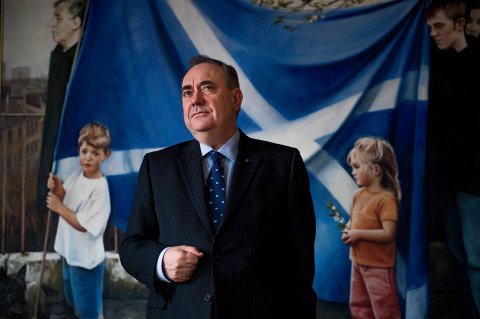
PATRIOT GAMES
"In my view, Scotland has got to get over Culloden," says an exasperated teacher as she distributes "Vote NAW" stickers in the heat of the afternoon. "It was hundreds of years ago and we're not oppressed."
In 1746, the Jacobite uprising led by Bonnie Prince Charlie was finally crushed by the troops of the Hanoverian King of England during one extremely bloody hour on the battlefield of Culloden, near Inverness. Unionists argue the wounds inflicted during the years before and after the 1707 Act of Union more than 300 years ago should now be allowed to heal; the great, enduring and, in many cases, justified resentments against rule from London are, they say, in danger of pushing Scottish voters into a dangerous and unknowable future.
Another earlier battle, Bannockburn, 700 years ago this summer, marked a great victory for the Scots over the English colonisers.
His opponents accuse Salmond of exploiting the anniversary with a lavish two-day commemoration to boost the emotional appeal of nationalism as polling day approaches.
Against such a complex whirl of historical and current grievances, and with so much at stake even beyond the British Isles, international figures have struggled to hit the right note with their interventions on behalf of preserving the UK. Barack Obama's pleas were met with a sardonic "Yes we can" from Alex Salmond. Hillary Clinton was mocked for lamenting that Britain might "lose" Scotland, as if it was a colony.
Only Pope Francis, influential to the 17% of Scots who are Catholic, has managed to sound adequately thoughtful. But by drawing a distinction between the need to "emancipate" some peoples and the desire of others to "dismember" a country by secession, for example in Spain and Italy as well as the UK, the Pope delighted unionists.
In spite of their continuing lead in the polls, No has seemed the less confident campaign, struggling to combat the -passion of committed nationalists. Even the activists seem diffident.
The schoolteacher, like all her colleagues, is prevented from publicly taking sides or trying to influence the pupils at the state school where she works, and won't give her name. She is firmly against independence, but her 20-year-old daughter, an undergraduate studying science at university in Glasgow, is, like many of her friends, committed to Yes: "We just haven't had the discussion, I haven't challenged her as to why, except that she feels Scotland would get a better deal."
Pollsters and campaigners agree that there may be some shy No voters. It has been a puzzle how to rouse their battle spirits and find an emotional level on which the unionist campaign can win over those doubtful about the SNP plan.
Malcolm Offord, a wealthy Conservative-supporting fund manager from Glasgow, seems an unlikely radical. But if the schoolteacher won't try to win over her own daughter, Offord is prepared to, with his argument in favour of a dramatically different but still intact United Kingdom, within which the Scots can be proud agitators for wresting power away from central government and giving it to the nations, regions and cities.
The one million Scots still undecided are, says Offord, disillusioned with politics and politicians generally, and often disengaged from the political process. While this alienation has traditionally been a recruiting agent for nationalism, Offord believes he has found a creative definition of Scottish patriotism, redefining relations between the English, Scots, Welsh and Northern Irish. "We, the Scots, secured the UK as much by our blood, brawn and intelligence, more even, than anyone else, and here we are again leading the charge: we don't have revolutions in this country, but we do have evolution. The UK remains strong but it is evolving."
By part-bankrolling a parallel No campaign, christened Vote No Borders, Offord says he is giving voice to the quiet pro-union Scots, arming them with an original argument – for change but against independence – and putting fire in their bellies. He describes it as a "people's platoon".
"The silent majority are quite fearful and quite sceptical but they are being drowned out by the noisy minority. We want to embolden them. This is a 300-year decision for your children and grandchildren," he explains.
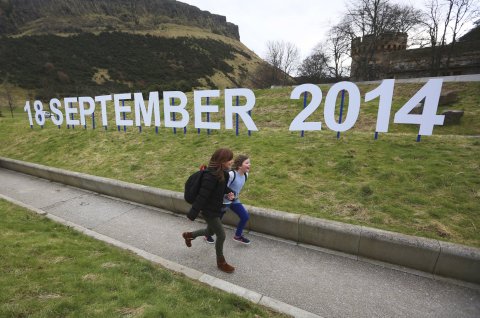
EVOLVE OR DIE
The hour of battle approaches – the Box Wars spectacular rounds off the weekend's jollities – and some of the stalls start to pack up. At Scottish Labour's red tent, the volunteers are looking forward to the party bringing out the big guns for the final few weeks. Rumours swirl around the stall that Gordon Brown, the former prime minister, will be storming the platforms of public meetings across the nation. As a characteristically forthright warm-up Brown warned that the case for maintaining the UK has nearly been lost "by mistake" and that in any case centralised government has lost its legitimacy and popular support.
"Even before a vote has been cast in September's referendum, Scotland has already changed Britain for ever," he wrote in the Guardian. "The Scots have already sunk without trace the old idea of Britain as a unitary state."
Since 1999, when another referendum led to Tony Blair's Labour government establishing the devolved parliament at Holyrood, a Scottish executive government has already been deciding on most domestic issues, including the historically separate health, education, university and justice systems in Scotland.
Porfessor Sir Tom Devine believes Holyrood has changed the British political landscape for ever. "You could say the union itself changed in 1999," he muses. "And it will never be the same again after this – the intensity of the political debate, between families, in the coffee houses, has been quite remarkable." Having so much of Scotland's policy decided here has, he believes, been "reinforcing the development of a greater sense of self-worth, of self-confidence".
Devine's account makes the current campaign sound like the start of a new Scottish enlightenment, and he agrees that it marks the end of something else – the British state in its current form and the traditional, inflexible insistence on the supremacy of its parliament at Westminster: "Unionism in the classic sense is now dead," he says, and what he calls "the muscular spine of a Scottish national identity" has provided the strength to deal it the fatal blow.
This "muscular" power terrifies other governments across Europe. Some resist granting their own internal nationalists any autonomy for fear of getting onto a road towards secession via what the anti-devolutionist member of the House of Commons, Tam Dalyell, used to call "a motorway with no exit".
But both Devine and Offord are making the optimistic, patriotic most, constitutional experts say, of a growing and inevitable appetite for change. "Independence and the status quo are both supported by a minority of Scots," says the IPPR's Lodge. "But giving Scotland more powers is popular."
The main UK political parties have united to guarantee greater autonomy, including a dramatic pledge from the Tories, whose devotion to the UK is so great that its very name is still the Conservative and Unionist Party, to give Holyrood full control over income tax levels.
Some parts of the welfare state could also be handed over. And within one month of a No vote the anti-breakaway parties have promised to meet and thrash out this new devolution bonanza.
Like Offord, Guy Lodge believes there will be a chain reaction resulting in more powers for the Welsh Assembly in Cardiff and the Stormont government in Northern Ireland, desperate to be given the discretion to compete on tax rates with the Republic. Slowly but surely, it will become necessary to overhaul the way the Houses of Parliament determine UK laws. And what about England, where the idea of a national identity other than Britishness has been gradually strengthened? "The English have always been the dominant members of the union and were not traditionally worried about devolution," says Lodge. "But over time that has changed. Now there is devolution momentum everywhere."
Malcolm Offord believes the English, particularly in the large Northern and Midlands cities like Manchester and Birmingham, should now demand their own settlement.
"The industrial working classes should say to the Scots, thank you for agitating on our behalf, we don't want to be bullied by Westminster either. Why not have a parliament at York?" he muses. "Why not have Westminster dealing just with the genuine UK issues like defence?"
"An English parliament is not yet on the cards," cautions Lodge, but he points out that serious historians no longer dismiss it as a mad idea – some mechanism will be needed to tackle the already glaring anomaly in the House of Commons that allows Scottish MPs to vote in matters that only affect England and Wales, or only England, when there is no reciprocal influence over policy any more.
This, the so-called "West Lothian question" will become more pressing after September's vote: "English votes for English laws" could become the norm, leading to different tiers of MPs in the Commons based on geography. House of Lords reform, the great unsolved mystery of British politics, could come back into play if it offered a solution to representing the regions and nations in the remaining body of central UK lawmakers.
Would other European nations look on and envy Britain in such a period of constitutional turmoil, just as the world is coming out of recession?
SONGS OF FREEDOM
Danny Mullins and his acoustic guitar are keeping the crowd entertained as it waits to see the Celtic Prince vanquished. "Yes to new-found freedom," he sings. "Yes to this brand new state." It's his chorus that seems to express more of what the wavering voters feel on this balmy afternoon: "There is too much power in the hands of too few."
Relaxing after his set, Danny explains: "People are really detached from politics. I know I am. Maybe having the government just at the end of the road instead of at Westminster would help." He believes that Holyrood has proved itself but still has to become both more assertive and more accountable.
But the crowds here share a general disgust with Westminster's politics and politicians as a class. "From Scotland, London looks like a remote city-state closer to the continent than to us," complains one senior Scottish member of the government benches in the Lords.
More powers for Scotland are inevitable, all unionist parties agree: but what is the end point? Pro-independence voices use devolution, which it was arrogantly claimed in the 1990s would "shoot the SNP fox", to argue that voters should now finish the job – it's an inevitable trajectory towards a separate Scotland. To some Conservatives, this is a sorry mess and Labour is clearly to blame.
"The constitutional tinkering of the past 20 years has been a disaster," believes James Forsyth, political editor of the weekly Spectator. "Devolution has not killed nationalism in Scotland, as its architects imagined, but led to a referendum on independence."
Fears abound that even victory for No, if narrow, could result in a "Neverendum": continuous wrangling and reiterated demands for plebiscites. But devolution, for many here in Edinburgh, is a battle only half-won and can offer "the best of both worlds" – especially if voters embrace the settlement they have been promised by the No parties, which moves closer and closer to the model of regional government that has served Germany so well. "It is fascinating to me that Gordon Brown, such a dedicated unionist, is prepared to use the word 'federal'," says Devine, who clearly finds these battles as invigorating as others, looking on from overseas, find them frightening.
As the vote looms closer, Scotland's referendum seems less an abstract constitutional curiosity affecting only the Scots, and more like a failure to combat the disillusion with the political classes, clustered around a parliament that has lost trust. The disaffection has now become a powerful centrifugal force, not to be resisted even by a mighty state that once governed two thirds of the globe. As Gordon Brown put it, answering his own question in stark terms: "Westminster's claim to have undivided authority over the country? Dead and buried."
To those who wield authority in some of the EU's currently undivided nations, who risk being drawn into their own battles similar to that being staged in Scotland, this is a frightening and all-too-real enactment of how their domestic conflicts might escalate.
"Wherever I go," says Lord Robertson, "I am asked about the Scottish referendum." While addressing the UN General Assembly in April, he says he experienced a wave of international anxiety: "The majority see the break-up of Britain as being a profoundly destabilising move in a fragile world."
Even if a schism is avoided, the dramatic shifts under way in the UK will jolt the country's neighbours and allies. "We're in the vanguard!" Offord exclaims proudly. "Leading the charge!" His "platoon" is ready for battle. But is anyone else?



